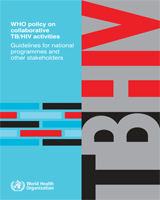Recommendation
Countries implementing collaborative TB/HIV activities should set their own country-specific process and impact targets for scaling up collaborative TB/HIV activities towards achieving the Millennium Development Goals.
Nationwide scale-up of collaborative TB/HIV activities is needed to achieve the targets set in the Global Plan to Stop TB (90) and the Universal Access goals established by the HIV community (91). These targets are in line with the Millennium Development Goals, to reduce mortality of people living with HIV from TB and to achieve universal access to treatment for HIV for all who need it.
Experience and best practices from countries that have pioneered nationwide expansion of collaborative TB/HIV activities have allowed identifying enablers of scaling-up (92). Setting time-bound targets for collaborative TB/HIV activities at national, regional, district and facility levels in a participatory manner (e.g. through the TB/HIV coordinating bodies) is essential. It facilitates timely implementation and monitoring, and helps to mobilize political commitment from HIV programmes and TB-control programmes and other stakeholders. Creating an environment conducive to the development of appropriate policy, operational guidelines, training manuals and protocols in line with international guidelines is essential. Expanding HIV testing in facilities by supporting TB health-care workers to test patients with presumptive and diagnosed TB and in communities is important to scaling up activities in HIV-prevalent settings. Similarly, as part of the public health approach of ART scale up, every effort should be exerted to expand the scale up of ART including using the highly decentralized TB service outlets. Ensuring an uninterrupted supply of HIV rapid tests, antituberculosis and antiretroviral medicines, and other HIV and TB commodities is crucial. Implementing recording and reporting formats that capture collaborative TB/HIV activities with inclusion of TB components in HIV registers and HIV components in TB registers is another enabler. Finally, it is of utmost importance to document the progress of implementation and performance of programmes as well as best practices in countries to inform and guide national and international policy recommendations.

